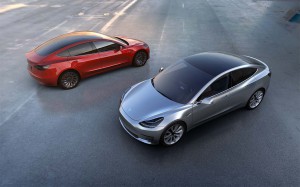Despite record production and deliveries – and a surging stock price – Tesla managed to disappoint on Wednesday by reporting a bigger loss than analysts had been forecasting – though revenues for the first quarter of 2017 did manage to beat expectations.
The Silicon Valley battery-carmaker reported a loss of $1.33 a share, significantly worse than the 81 to 83-cent loss various tracking firms had Wall Street trackers predicting. The company has turned a quarterly profit – using non-standard accounting – only twice since it went public.
The news wasn’t entirely disappointing. Tesla’s revenues for the January-through-March quarter came in at $2.70 billion, about $90 million above expectations. Production, the company said, was up by 64%, year-over-year. And Tesla previously had reported that it delivered 25,051 vehicles during the quarter, an all-time record, with a target of 50,000 battery-cars for the first half.
(Musk lays out plans for “Boring” company. Click Here to see how it plans to change the way we travel.)
Tesla announced its earning shortly after the closing bell on the New York Stock Exchange, so it isn’t immediately apparent how investors will react. But they have driven TSLA shares up to record levels in recent weeks, Tesla now commanding a higher market capitalization than either General Motors or Ford Motor Co.
Key to the strong support: Tesla CEO Elon Musk’s promise to get the long-awaited Model 3, the company’s first mainstream battery-electric vehicle, into production by July. Musk has predicted Tesla will sell a total of 500,000 vehicles in 2018, about three-quarters of those the new sedan which will carry a base price of under $40,000 before factoring in the $7,500 federal tax credit.
There have been a few caveats. Starting off the new year, Tesla was running short of cash, but a recent stock offering helped it boost its cash on hand to $4 billion going into Q2, the company said on Wednesday.
Meanwhile, the carmaker is racing to settle a labor dispute with workers at a machine tool subsidiary in Germany that could lead to a strike that would short-circuit Tesla’s aggressive ramp-up plans for the Model 3.
Tesla has also faced a recent setback in the form of a downgrade of its big Model S sedan by influential Consumer Reports magazine. The non-profit publication faulted Tesla for failing to activate a critical safety feature, emergency automatic braking, in those vehicles produced since last October, when Tesla revised the Model S electronic hardware system. The carmaker says it is now activating that technology using over-the-air updates, and hopes to regain its ranking from CR.
(Consumer Reports downgrades Tesla Model S. Click Here to learn why.)


